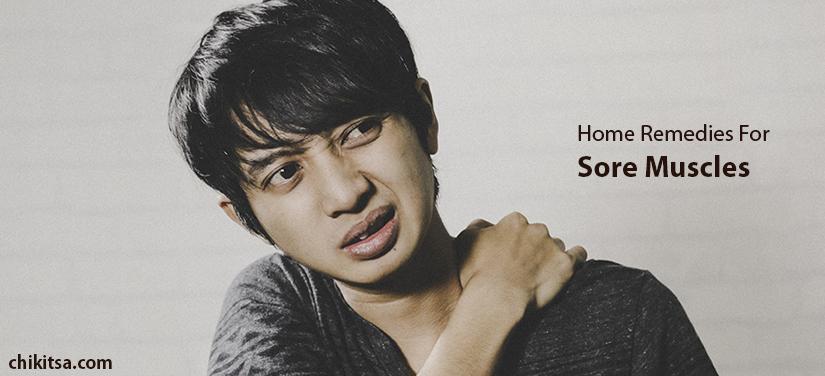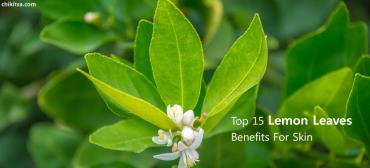9 Best Home Remedies For Sore Muscles

What Do Sore Muscles Mean?
Sore muscles refer to painful muscles. Muscle soreness is usually an exercise-related pain that occurs when any physical activity places too much or unusual stress on the muscles.
Sore muscles can occur during or immediately after a workout known as acute muscle soreness or can occur after 12-24 hours of workout that lasts up to 2-3 days called Delayed-onset muscle soreness (DOMS).
Few other reasons for sore muscles that do not involve exercise include dehydration; blood flow problems because of lack of physical activity or an illness; deficiency of calcium, potassium, and magnesium; and certain medications like statins and chemotherapeutic drugs.
Symptoms Of Sore Muscles
Common symptoms of sore muscles include;
- Muscles may become tender to touch
- Muscle pain and stiffness causing a reduced range of movement
- Loss of muscle strength that is usually temporary
- Muscle fatigue
- Swelling of the affected muscles
The muscles usually affected are the ones that are used the most during a workout – neck, legs, arms, and lower back
What Causes Sore Muscles?
Sore muscles occur because of the following activities;
- Introducing a workout or an exercise to a routine for the very first time
- Adding a new exercise to a regular workout
- Increasing the intensity of a workout or an exercise
- Performing the same workout for a long period
- Repeating the workout without taking sufficient rest
Causes Of Acute Sore Muscles And DOMS
Acute sore muscles are usually felt as a burning sensation and occur because of the rapid build-up of lactic acid in your muscles during a workout. This acute soreness disappears once you stop the workout.
DOMS is believed to be caused by microscopic tears in your muscle fibers or breakdown in muscle tissue during a heavy workout. When the muscle damage or micro-tearing happens, the body responds by initiating a repair process at the site of injury. This repair process causes inflammation that results in delayed onset of soreness in the muscles. Any high-intensity exercise can cause DOMS, but particularly it is thought to be caused by eccentric exercises that involve tensing and lengthening of the muscles at the same time.
Home Remedies For Sore Muscles
You can prevent DOMS by easing into workouts gradually. Once it sets in, you can take a few steps to ease the discomfort while your muscles repair themselves.
Below mentioned are a few home remedies for sore muscles of the neck, sore muscles of arms, sore muscles of legs, and sore muscles of the lower back.
1. Massage
A massage promotes healing and relieves the pain of DOMS by increasing the blood flow to the affected area.
How To Use
Apply oil or lotion to the affected area and massage gently. Avoid deep tissue massage as it can irritate the muscles and worsen the pain.
[Also Read: Massage for parkinson's disease]
2. Heat Therapy
A warm bath increases the blood flow to sore muscles and eases the pain and stiffness caused by DOMS. Heat pads can also be used for temporary pain relief.
3. Cold Therapy
Ice packs or immersion in cold water is a longer-term treatment for sore muscles that work by reducing inflammation and swelling of the muscles. This therapy is very effective as it numbs your nerve endings to help combat DOMS pain.
4. Compression Clothing
Compression clothing is another great way to increase blood flow and flush out toxins.
How To Use
Wearing compression clothing during your workouts and wearing compression socks for up to 24 hours straight after your workout can significantly reduce the pain associated with DOMS.
5. Light Exercise
Light exercises will keep your muscles active. Gentle stretching and walking help increase the blood flow and reduce muscle soreness.
[Also Read: Exercises to boost immunity]
6. Epsom Salts
Epsom salt is rich in magnesium sulfate which is a natural ingredient to relax sore muscles. It also helps reduce swelling of the muscles by drawing all the fluids out of the tissue.
How To Use
Add a cup of Epsom salt in a warm tub of water and then soak the muscles in the water for around 15 minutes or till it cools down. It works like magic and can be done 3 times a week.
7. Apple Cider Vinegar
Apple cider vinegar reduces the soreness of muscles due to its anti-inflammatory and alkalizing properties, which help reduce muscle pain and inflammation.
How To Use
Mix one tablespoon of apple cider vinegar in a glass of water and consume it or you can also apply and rub directly on the affected area of soreness.
8. Essential Oils
Few essential oils and blends of these oils are helpful for muscle pain relief.
How To Use
Add one or two drops of essential oils into one tablespoon of carrier oils such as coconut oil or olive oil and apply and massage the affected area
Examples
- Muscle Cramps - Lemongrass, peppermint, and marjoram essential oils.
- Muscle Tension - Marjoram, peppermint, lavender essential oils.
- Muscle Spasms- Basil, marjoram, and Roman Chamomile essential oils.
[Also Read: Essential oils for swollen feet]
9. Cherry Juice
Tart cherry juice contains antioxidants that help reduce muscle soreness and discomfort. It is also found to increase muscle strength. Studies have shown that tart cherry juice is very effective for relief from sore muscles.
How To Use
Cherry juice can be added to your smoothie after a heavy workout day.
When To See A Doctor
In severe cases, your muscles can break down and you can become very ill and your kidneys can get damaged. so, you must see a doctor if;
- You have severe unbearable pain
- Your DOMS lasts more than a week
- Your urine becomes dark
- You have severe swelling in your arms and legs









